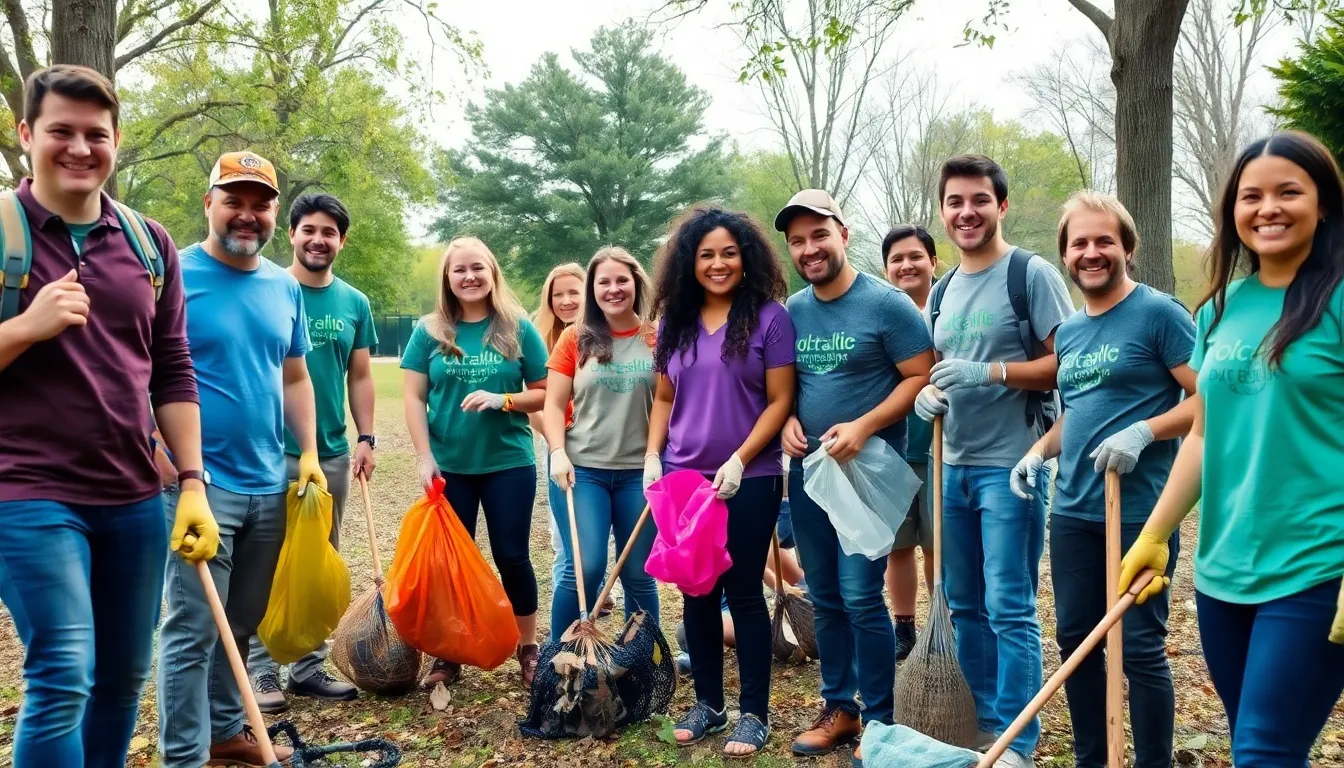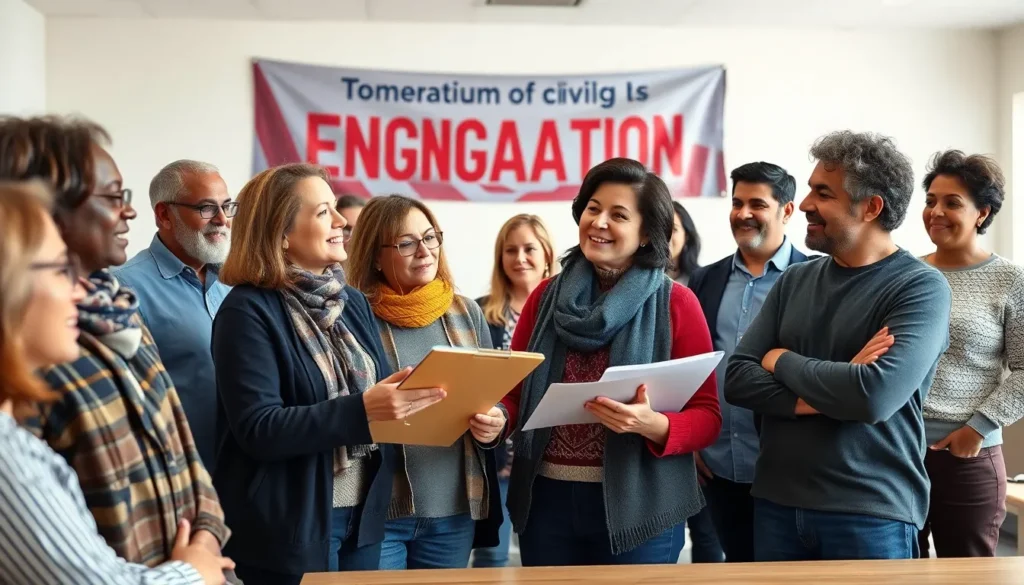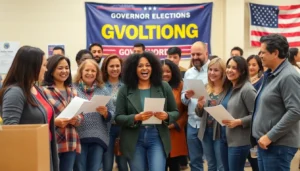Civic engagement plays a vital role in shaping communities and fostering democratic values. It empowers individuals to participate actively in societal issues, from voting and volunteering to advocating for policy changes. When people engage with their communities, they not only influence decision-making but also strengthen the fabric of society.
In an age where information is abundant and connectivity is at our fingertips, understanding the importance of civic engagement is more crucial than ever. It bridges the gap between citizens and their governments, ensuring that voices are heard and needs are addressed. By cultivating a culture of participation, communities can thrive and evolve, reflecting the diverse perspectives of their members.
Table of Contents
ToggleUnderstanding Civic Engagement
Civic engagement encompasses the various ways individuals participate in their communities and influence governance. It includes activities such as voting, community service, advocacy, and public dialogue.
Definition of Civic Engagement
Civic engagement refers to actions and activities where individuals contribute to their communities’ political, social, and economic life. It involves participating in local organizations, joining social movements, and advocating for change. Civic engagement enhances democratic processes by encouraging citizens to express their opinions and take action on crucial issues.
Importance of Civic Engagement
Civic engagement plays a vital role in strengthening democracy. Engaged citizens foster accountability in local and national governance. Active participation leads to better public policies that reflect the diverse needs of the community. Additionally, civic engagement builds social cohesion by connecting people with shared interests and goals. Stronger communities arise from individuals collaboratively addressing societal challenges.
Forms of Civic Engagement

Civic engagement manifests in various forms, enabling individuals to contribute positively to their communities. Key forms include volunteering, voting, and community organizing, each playing a significant role in shaping societal dynamics.
Volunteering
Volunteering involves dedicating time and skills to support community needs or causes. Nonprofit organizations, schools, and local initiatives seek volunteers for diverse activities, including tutoring students, assisting at food banks, or participating in environmental clean-ups. In 2021, approximately 77 million Americans engaged in volunteer work, illustrating the substantial impact of collective effort in addressing community challenges.
Voting
Voting serves as a fundamental democratic act, allowing citizens to express their preferences on issues and elected officials. In 2020, voter turnout reached about 66.8%, the highest for a presidential election in the U.S. since 1900. This participation reflects individuals’ investment in shaping their governance and ensuring representation of diverse perspectives. Accessible voting methods and robust voter education programs enhance civic engagement and encourage informed decisions.
Community Organizing
Community organizing entails mobilizing individuals to advocate for shared concerns and drive social change. Organizers identify specific issues, build coalitions, and empower local voices to influence policies. Successful campaigns address various topics, such as housing rights, educational equity, and environmental sustainability. Through workshops, meetings, and direct actions, community organizing fosters solidarity and collective action, amplifying community members’ influence in the decision-making process.
The Impact of Civic Engagement
Civic engagement significantly influences communities and governance. It drives social cohesion and enhances political representation, benefiting both individuals and society.
Social Benefits
Civic engagement promotes strong social connections and community solidarity. Engaged citizens often find a sense of belonging and purpose, which fosters mental well-being. Active participation in community initiatives leads to improved social networks, enhancing trust among residents. These networks enable collaborative problem-solving, allowing communities to address local challenges efficiently. According to the Corporation for National and Community Service, individuals who engage in volunteerism exhibit higher levels of life satisfaction and reduced feelings of isolation. Furthermore, civic activities like neighborhood clean-ups or local educational programs create shared experiences, reinforcing community identity and pride.
Political Benefits
Civic engagement strengthens democratic processes and political representation. Active participation, including voting and advocacy, encourages accountability among elected officials. Higher voter turnout correlates with policies that reflect the electorate’s needs. The U.S. Census Bureau reported that communities with robust civic participation experience increased political engagement and awareness, leading to informed voting decisions. Engaged citizens are more likely to attend town hall meetings, advocate for policy changes, and run for public office. This grassroots involvement fosters diverse perspectives in governance, ensuring that various voices contribute to the policy-making process and address pressing societal issues effectively.
Challenges to Civic Engagement
Civic engagement faces several challenges that can inhibit individuals’ participation in their communities and local governance. Understanding these barriers and misconceptions can help address and mitigate their impact.
Barriers to Participation
Barriers to civic engagement include various factors that prevent individuals from participating fully. Some key barriers are:
- Economic constraints: Lack of financial resources restricts access to events or meetings, limiting participation.
- Time limitations: Busy work schedules or personal commitments reduce available time for civic activities, such as volunteering or attending local meetings.
- Educational disparities: Individuals with lower educational attainment may lack awareness or confidence in civic processes, hindering their involvement.
- Social isolation: Those who lack strong community ties or support networks may feel disconnected and less motivated to engage.
- Language barriers: Non-native speakers of English may struggle to access information or communicate effectively, limiting their participation in civic events.
Misconceptions about Civic Engagement
- Civic engagement is only for the politically active: Many believe that only those pursuing political careers should engage, neglecting the importance of community involvement for everyone.
- Voting is the sole form of engagement: Voting represents just one method of participation; activities like volunteering and community organizing are equally vital.
- Civic engagement requires extensive knowledge: Individuals may feel intimidated, believing they need in-depth knowledge of political issues, which isn’t necessary to contribute meaningfully.
- Engagement doesn’t lead to real change: Skepticism about the effectiveness of civic participation can lead to apathy; however, collective actions often drive significant social reforms.
Strategies to Enhance Civic Engagement
Enhancing civic engagement requires targeted strategies that empower individuals and strengthen communities. Two effective approaches include educational initiatives and community partnerships.
Educational Initiatives
Educational initiatives play a vital role in fostering civic engagement. Programs that promote civic education in schools increase awareness of governmental processes, rights, and responsibilities. Teaching curriculum components such as the Constitution and local government structures enables students to understand their democratic roles. For instance, integrating simulation activities like mock elections provides firsthand experience in voting processes. Workshops and seminars for citizens of all ages can also enlighten participants about advocacy techniques and community issues, driving informed engagement.
Community Partnerships
Community partnerships amplify civic engagement by uniting resources and efforts among organizations, businesses, and local governments. Collaboration fosters a network that enhances outreach and support for community events. For example, public libraries and civic organizations can work together to host forums that discuss pressing community topics, encouraging diverse voices to contribute. By leveraging local businesses as sponsors for civic events, access expands to broader audiences, thus increasing participation rates. These partnerships foster a sense of solidarity and shared responsibility, directly correlating with enhanced civic involvement and community well-being.
Civic engagement is crucial for building vibrant communities and ensuring democratic values thrive. By actively participating in local issues individuals not only influence governance but also foster stronger social bonds. This collective effort leads to improved public policies that genuinely reflect community needs.
Overcoming barriers to participation is vital for cultivating an engaged citizenry. By implementing educational initiatives and forming community partnerships, everyone can contribute to a culture of involvement. Ultimately, a commitment to civic engagement empowers individuals and strengthens the fabric of society, creating a more inclusive and responsive governance system.





